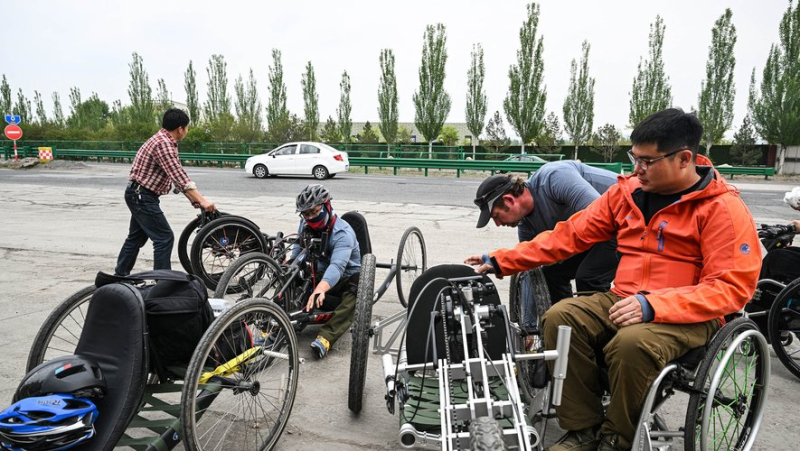“I felt like I was as fast as a machine: China offers more affordable bikes for disabled cyclists

China adopted a law on accessibility for people with disabilities last year, but they still face many obstacles on a daily basis. HECTOR RETAMAL/AFP
On the dusty roads of Inner Mongolia, in the Chinese countryside, they overtake herds of sheep and intrigue the villagers: these disabled cyclists are testing a new model of adapted and more affordable bicycle.
Lying in their "handbike" or hand bike, they are part of the Krankin' Thru China, which has been helping Chinese people in wheelchairs to play sports in the great outdoors for ten years.
Groups of residents encourage them as they pass, while these cyclists avoid trucks and holes in the road to reach the regional capital Hohhot, in the north of the country.
China adopted a law on accessibility for people with disabilities last year, but they still face many obstacles on a daily basis.
"From the start, we wanted to use handcycles, to encourage our disabled friends to go out", says Wang Feng, 41, who discovered these adapted bicycles, also called recumbent bikes, a few years after losing the use of his legs following an illness.
To promote his message, Krankin' Thru China has already made several trips to remote corners of China, notably in 2017 when the collective spent three months traveling from the mountainous province of Yunnan (southwest) to Beijing.< /p>
Now he is collaborating with a university in Shanghai on a prototype handcycle that is more affordable and easy to repair. It is this model that is tested in this new journey through Inner Mongolia.
"Impressive"
Starting point of the trip, started at the beginning of May: Chahar, a very sparsely populated area of the province, best known for its mines and its volcano. Wang Feng, who is accompanied by two other cyclists, Pan Yifei and the American Joshua Dominick, takes the opportunity to educate people he meets along the way.
"When I tell them that it's a crank bike intended for disabled people, they are very surprised (…) they find it really impressive", he confides. In Hohhot, the group had the bikes tested by an association of disabled people on a circuit, under the amused gaze of children and retirees who came to admire them.
"I've seen this in videos before but never tried it myself", enthuses Di Wenke, 36, who practices wheelchair dancing. On the bike, "I had the impression of being as fast as a machine and that felt envy of the people who looked at me".
For him, sports such as wheelchair dancing or handcycling help fight against the stigma associated with disability. "Having your own hobby is very rewarding". In addition to his bicycle trips, Krankin' Thru China regularly offers adapted swimming or horse riding sessions.
"The disabled friends I know have changed their attitude" towards disability, assures Wang Feng . Many of them asked him how to get more involved in the collective.
"Enjoying the world"
But there is still much to be done, as the cyclists found as they approached Hohhot: finding a wheelchair-accessible hotel didn't work. was simple.
If large Chinese cities have made significant progress in recent years, adapting their infrastructure and buildings to handicaps, this is not the case for most smaller municipalities and in rural areas.
As for handcycles, they remain prohibitively expensive and their spare parts are often very difficult to replace. "This has already happened to us, when we were on the road in Yunnan and there was a breakdown: it was a big risk in terms of security", remembers Wang Feng.
"Most adaptive equipment must be custom made, which makes it very expensive and severely limits options", underlines his teammate Pan Yifei. "So there are very few people who can access these sports".
The prototype tested in Inner Mongolia aims to change that: designed by researchers from New York University, it was assembled by the team, assisted by Professor Noel Joyce and his students from the Shanghai campus of New York University.
Its plan is freely accessible and its parts are standard, therefore available in most specialized stores. "Any disabled person should be able to repair a bicycle in the same time as an able-bodied person", believes Noel Joyce. With, in the end, one objective: "that people with disabilities are outside more often, to enjoy the world".




